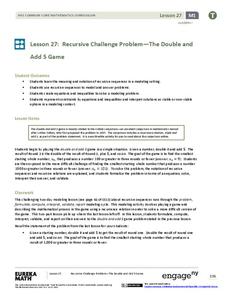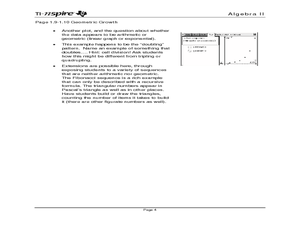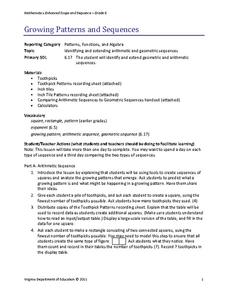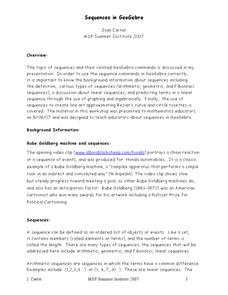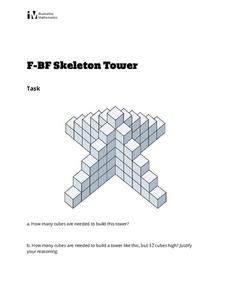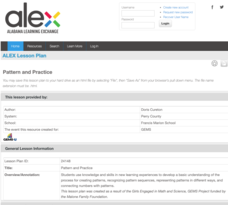West Contra Costa Unified School District
Connecting Arithmetic Sequences to Linear Equations
Common difference is to arithmetic sequences as what is to linear equations? (Answer: slope) Pupils learn how arithmetic sequences can be considered as linear patterns. They then write linear equations to represent arithmetic...
West Contra Costa Unified School District
Arithmetic Series
Fall for a series. Learners determine how to find out how far a skydiver falls in the first 20 seconds. The Algebra II instructional activity introduces the idea of adding up the terms of an arithmetic sequence. Pupils learn how to use...
EngageNY
Arithmetic and Geometric Sequences
Arithmetic and geometric sequences are linear and geometric patterns. Help pupils understand the relationship and see the connection with an activity that asks them to write the rules and classify the patterns correctly. A sorting...
EngageNY
Modeling from a Sequence
Building upon previous knowledge of sequences, collaborative pairs analyze sequences to determine the type and to make predictions of future terms. The exercises build through arithmetic and geometric sequences before introducing...
EngageNY
Integer Sequences—Should You Believe in Patterns?
Help your class discover possible patterns in a sequence of numbers and then write an equation with a lesson plan that covers sequence notation and function notation. Graphs are used to represent the number patterns.
Curated OER
Sequence Investigation
Eleventh graders investigate arithmetic sequences. In this Algebra II lesson, 11th graders create an arithmetic sequence and explore the effect of each variable in the formula of the nth term of an arithmetic sequence. ...
EngageNY
Recursive Formulas for Sequences
Provide Algebra I learners with a logical approach to making connections between the types of sequences and formulas with a lesson that uses what class members know about explicit formulas to develop an understanding of...
EngageNY
Recursive Challenge Problem—The Double and Add 5 Game
As a continuation of a previous lesson, this activity builds on the concept of calculating the terms of a sequence. Pupils are challenged to determine the smallest starting term to reach a set number by a set number of rounds. Notation...
West Contra Costa Unified School District
Search and Rescue Activity
Get your classes moving and practicing sequences at the same time! Learners move about the room solving problems and finding their solutions. Problems include both recursive and explicit formulas and both geometric and arithmetic sequences.
EngageNY
Geometric Sequences and Exponential Growth and Decay
Connect geometric sequences to exponential functions. The 26th installment of a 35-part module has scholars model situations using geometric sequences. Writing recursive and explicit formulas allow scholars to solve problems in context.
West Contra Costa Unified School District
Geometric Sequences
Place a instructional activity on sequences in your sequence of lessons. Scholars first learn the basics of geometric sequences, such as common ratios and then they write recursive and explicit formulas for geometric sequences.
Virginia Department of Education
Arithmetic and Geometric Sequences
Future mathematicians learn about arithmetic and geometric sequences, as well as common ratios and differences as they complete a worksheet matching sequences with the algebraic expressions that represent them.
Kenan Fellows
Dinner Party: Using Pattern Trains to Demonstrate Linear Functions
Nothing fancy here ... just your run-of-the-mill Algebra party! Learners explore the patterns of linear functions while designing seating arrangements for a dinner party. Comparing the number of tables to the perimeter of the combined...
EngageNY
Recursive Challenge Problem—The Double and Add 5 Game
Math is all fun and games! Use a game strategy to introduce the concept of sequences and their recursive formulas. The activity emphasizes notation and vocabulary.
Curated OER
Sequences
Students solve problems using the TI. In this calculus lesson, students evaluate functions using sequences. They graph the functions on the TI and make observations.
Curated OER
An Introduction to Sequences
Fourth graders are introduced to arithmetic and geometric sequences. In this mathematics lesson, 4th graders produce a variety of sequences by varying the starting number, multiplier, and the add-on number.
Curated OER
Sequence Graphs
Investigate arithmetic and geometric sequences by using a graphing calculator to determine if a sequence is linear or exponential.
Virginia Department of Education
Growing Patterns and Sequences
Learners explore, discover, compare, and contrast arithmetic and geometric sequences in this collaborative, hands-on activity. They build and analyze growing patterns to distinguish which kind of sequence is represented by a set of data...
Curated OER
Sequences in Geogebra
Students follow detailed directions to use the GeoGebra program. In this mathematics lesson, students find the nth term of a sequence, and use line art to approximate a Bezier's curve. Students locate points and segments on a circle. The...
Curated OER
Skeleton Tower
Your algebra learners build a quadratic function in this task of counting the blocks used to build objects. The arithmetic sequence that shows up brings up a shortcut to the long addition using the Gauss Method. Eventually, learners...
Curated OER
Algebraic Processes And Its Connections To Geometry
Youngsters explore number patterns within a Hundreds Chart. They discover six specific patterns from six teacher-directed rules in cooperative groups and describe in words ONE of the three patterns in their Learning Logs. They prove for...
EngageNY
The Power of Exponential Growth
How do you make a penny grow to $5,000 in just 15 days? Use the examples in this lesson to explore the concept of exponential growth and its comparison to linear models. Pupils come to understand that exponential growth eventually...
West Contra Costa Unified School District
Writing Exponential Functions Based on Data
Give your class a concrete example of exponential growth and decay using this hands-on activity. These Algebra II lessons allow for the exploration of exponential growth and decay models, as well as the discovery of the patterns of...
Alabama Learning Exchange
Pattern and Practice
Young scholars learn how to make patterns. Students first display their prior knowledge of patterns before delving into the lesson. They complete a worksheet and participate in a web-based class activity. They work in cooperative groups...







